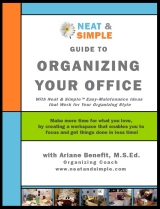Hot off the presses: My friend Ariane Benefit of the Neat & Simple Living blog has just published the Neat & Simple Guide to Organizing Your Office. I bought and downloaded it last week (she's offering a special introductory price of $12.95 through February 1) and read it on the plane the other day.
 If you're struggling with clutter and organizational challenges in your office, this guide was meant for you. You'll be led through some background about chronic disorganization, motivations for getting more organized, and why you may be "stuck" in a messy situation.
If you're struggling with clutter and organizational challenges in your office, this guide was meant for you. You'll be led through some background about chronic disorganization, motivations for getting more organized, and why you may be "stuck" in a messy situation.
Organize to fit your style
Ariane takes you through an analysis of various working, thinking, and organizing "styles" and discusses how to tailor your organizational scheme to better support your own style. She provides a step-by-step guide to analyzing and dealing with the clutter in your workspace. Another useful section of the guide provides examples of various kinds of organizing tools (bins, shelves, stands, etc.) and discusses the merits and potential pitfalls of each tool. I found this section to be valuable and thought-provoking.
She also offers quite a collection of tips for filing, electronic organization, reinforcing and maintaining you systems, and other hints to help you achieve and maintain success in your quest for organization.
And if you still feel overwhelmed after reading the book, you may need professional (organizational) help. If so, Ariane has a brief discussion on selecting a professional organizer to get you on track.
One last comment on this guide: it just feels organized. It's loaded with useful pictures -- and the layout, graphics, and flow of the book are awesome.
Read More
 I say it's like a workshop, because the document is actually a workbook designed so that you can print it out and write our your thoughts and answers in the book. You can then use the workbook throughout the year to remind you what you identified as important, which things you want to achieve, etc. It's generally known that writing things down helps make ideas more "real" in your brain, and I found that writing my answers down also felt good - like I was taking concrete steps to plan for 2008.
I say it's like a workshop, because the document is actually a workbook designed so that you can print it out and write our your thoughts and answers in the book. You can then use the workbook throughout the year to remind you what you identified as important, which things you want to achieve, etc. It's generally known that writing things down helps make ideas more "real" in your brain, and I found that writing my answers down also felt good - like I was taking concrete steps to plan for 2008. 99.
99.  I was chatting with a friend of mine about data backup this week and he mentioned he'd seen my
I was chatting with a friend of mine about data backup this week and he mentioned he'd seen my  I mentioned time auditing in my last post and in the past I've written about
I mentioned time auditing in my last post and in the past I've written about  Procrastinating / goofing off
Procrastinating / goofing off